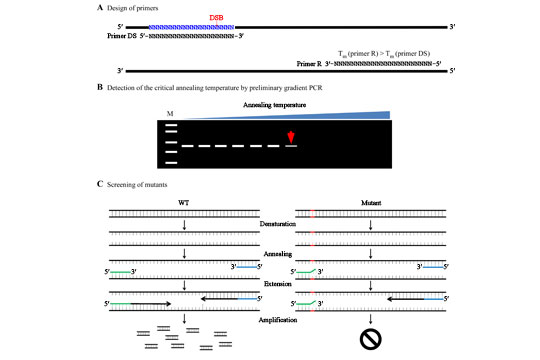







A simple and efficient method for CRISPR/Cas9-induced mutant screening
April 10th, 2017
The clustered regularly interspaced short palindromic repeats (CRISPR)/CRISPR-associated protein 9 (Cas9) system provides a technological breakthrough in mutant generation. Several methods such as the polymerase chain reaction (PCR)/restriction enzyme (RE) assay, T7 endonuclease I (T7EI) assay, Surveyor nuclease assay, PAGE-based genotyping assay, and high-resolution melting (HRM) analysis-based assay have been developed for screening CRISPR/Cas9-induced mutants. However, these methods are time-consuming and costly and may also be sequence-limited or require very expensive equipment.
Recently, researchers from China National Rice Research Institute (CNRRI) and Soochow University described a cost-effective and sensitive screening technique based on conventional PCR, annealing at critical temperature PCR (ACT-PCR) for identifying mutants. ACT-PCR requires only a single PCR step followed by agarose gel electrophoresis. They demonstrated that ACT-PCR accurately distinguished CRISPR/Cas9-induced mutants from wild type in both rice and zebrafish. Moreover, the method can be adapted for accurately determining mutation frequency in cultured cells. The simplicity of ACT-PCR makes it particularly suitable for rapid, large-scale screening of CRISPR/Cas9-induced mutants in both plants and animals.
This work was supported by the National Natural Science Foundation of China, and the Agricultural Science and Technology Innovation Program of Chinese Academy of Agricultural Sciences. The research finding has been published in Journal of Genetics and Genomics online on April 4, 2017 (DOI: 10.1016/j.jgg.2017.03.005). More details are available on the links bellow: http://www.sciencedirect.com/science/article/pii/S1673852717300577
CNRRI Today
Copyright © 2014- China National Rice Research Institute